Under Construction
The universe has been under construction since approximately 14 billion years ago… and it’s still a work in progress.
As of
2025-07-28
, our existence began roughly 14 billion years ago—give or take. When we zoom out to the grand tapestry of time, our planet, humanity, and our achievements are but fleeting moments. Perspective matters, and understanding the vastness of time can humble us, inspire us, and remind us of our place in the cosmos.
A Journey Through Time: Milestones of Existence
Let’s take a moment to appreciate some of the most significant happenings in our existence, highlighting just how recent many of our advancements are compared to the age of the universe.
🌍 Planet Earth: 4.5 Billion Years Ago
Our home, Earth, formed about 4.5 billion years ago. For the vast majority of its history, it was a barren, inhospitable place. Life emerged around 3.5 billion years ago, evolving slowly through countless epochs until complex organisms appeared.
🧬 Separation from Other Apes: 4 Million Years Ago
Around 4 million years ago, our ancestors began to diverge from other great apes, marking the evolutionary branch that would eventually lead to modern humans. This separation set the stage for the development of distinct human traits, such as bipedalism, larger brain sizes, and more complex social structures. This pivotal moment in evolution laid the groundwork for the sophisticated societies and technologies that define humanity today.
Humans share their most recent common ancestor with chimpanzees and bonobos, our closest living relatives1. This ancestor likely existed between 6 to 7 million years ago, and over time, the lineages diverged, leading to the distinct species we recognize today.
🗣️ Fictive Language: 70,000 Years Ago
Human language is a relatively recent development in the grand scheme of things. Fictive language—our ability to create and use complex languages—only began around 70,000 years ago. This breakthrough allowed for the transmission of knowledge, culture, and innovation across generations.
🌾 Agriculture: 12,000 Years Ago
The shift from nomadic hunter-gatherer societies to settled agricultural communities occurred about 12,000 years ago. This revolution enabled population growth, the development of cities, and the rise of civilizations.
✝️ Christianity: 2,000 Years Ago
Religious and philosophical systems have shaped human societies profoundly. Christianity, one of the world’s major religions, emerged around 2,000 years ago, influencing art, culture, law, and ethics.
🏭 Industrial Revolution: 1760
Fast forward to the Industrial Revolution in 1760, a pivotal era that transformed economies from agrarian to industrial. It marked the beginning of mass production, technological innovation, and significant social change.
📻 Radio: 1895
The invention of the radio in 1895 revolutionized communication, allowing information and entertainment to be broadcasted to the masses, shrinking the world and connecting people like never before.
📺 Television: 1920
Television, introduced in the 1920s, further transformed media and entertainment, becoming a central part of daily life and shaping public opinion and culture on a global scale.
🔬 Transistor: 1947
The creation of the transistor in 1947 was a monumental leap in electronics, paving the way for modern computing, telecommunications, and the digital age.
💰 End of the Gold Standard: 1971
In 1971, the world saw the end of the gold standard, transitioning to fiat currencies. This shift fundamentally changed global economics, finance, and trade systems.
📱 Cell Phone: 1973
The invention of the cell phone in 1973 revolutionized personal communication, making it possible to stay connected anytime, anywhere, a precursor to the mobile-centric world we live in today.
💻 Apple I: 1976
The release of the Apple I in 1976 marked the dawn of personal computing, democratizing access to technology and laying the groundwork for the tech-driven society we now inhabit.
📱 iPhone: 2007
Apple’s iPhone, introduced in 2007, redefined mobile technology, integrating communication, computing, and entertainment into a single device, fundamentally altering how we interact with the world.
🧠 AlphaGo: 2016
AlphaGo, an artificial intelligence developed by DeepMind, achieved a groundbreaking milestone by defeating the world champion in the ancient board game of Go. This achievement was remarkable because Go is a game of immense complexity, requiring intuition and strategic depth that were once thought to be uniquely human capabilities. AlphaGo’s success demonstrated the potential of deep learning and neural networks, reshaping how researchers approached AI problems. It paved the way for advancements in problem-solving AI and inspired innovation in fields like medicine, logistics, and scientific discovery.
🤖 Transformers: 2017 (Attention is All You Need)
In 2017, the paper “Attention is All You Need” introduced the Transformer model, revolutionizing artificial intelligence and natural language processing. This breakthrough enabled more sophisticated and human-like interactions with machines, paving the way for advanced AI applications.
🤖 Artificial General Intelligence (AGI): TBD
The quest for Artificial General Intelligence (AGI) represents one of the most ambitious and transformative milestones of our time. Unlike narrow AI, which excels in specific tasks, AGI aims to create machines with the ability to understand, learn, and apply knowledge across a wide range of activities, mirroring human cognitive abilities.
A Work in Progress Until the End of Time
Our universe, our planet, and our species are all under construction. From the birth of stars to the evolution of life, from the first spark of human language to the cutting-edge technologies of today, every moment is a step in an ongoing journey. We have achieved remarkable things, but the timeline of existence reminds us how much more there is to explore, understand, and create.
Unless professor Nima Arkani-Hamed 2 says otherwise!
- TODO: citation needed for more sources.
⚠️ Please take a look at the LLM Disclaimer
-
Nima Arkani-Hamed is a renowned theoretical physicist known for his groundbreaking work in understanding the fundamental nature of space and time. His research often challenges our conventional notions of these concepts, suggesting that they may be emergent properties of a deeper underlying reality. Perhaps he holds the keys to the next chapter in our cosmic construction, or maybe he is hinting at even more profound mysteries yet to be uncovered. ↩︎
